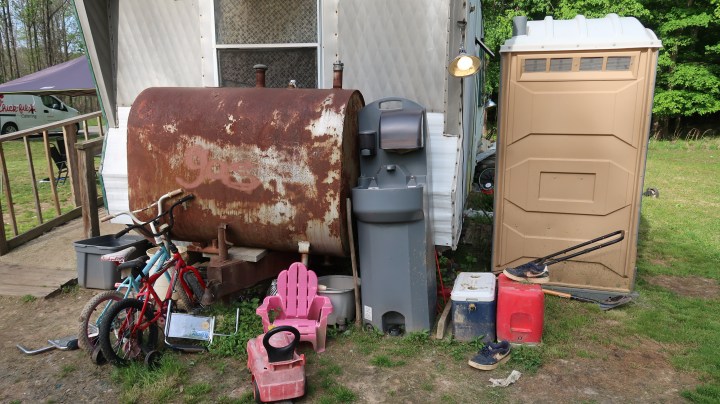
An hour from the nation’s capital, a different infrastructure debate
An hour from the nation’s capital, a different infrastructure debate

As the infrastructure debate continues in Washington, D.C., a community just outside the Capital Beltway still has many residents without access to running water.
According to the non-profit LifeStyles of Maryland, more than 70 families in the rural community of Nanjemoy, Maryland, lack indoor plumbing or regular access to potable water, relying instead on purchased or donated freshwater. Tammy Gausman, volunteer coordinator for the group, said it has delivered four hand-washing stations and portable toilets to families in the community.
“And as soon as we did that, we got a bunch more families that came forward with more needs,” Gausman said. LifeStyles is also working with local businesses to deliver hundreds of gallons of fresh water to residents on a regular basis.
Jonathan Young, a manager of a Chick-fil-A in Waldorf, Maryland, worked with a team of volunteers on a recent weekend to deliver about 600 gallons of water in the community. “And you want to talk about wealth gaps,” he said, “within like a small community like Nanjemoy, there are some very, you know, middle upper-class people who live [there]. So it’s not like the whole place is without water.”

This is a classic example of water access and infrastructure disparity in America, according to Sara Aminzadeh of the U.S. Water Alliance.
“There are two million Americans living without running water and basic indoor plumbing and many more without sanitation,” Aminzadeh said. “And it’s largely an invisible crisis”
She said communities without basic water infrastructure tend to be low-income communities of color, often “rural communities too small and geographically remote to support the kind of larger, more centralized drinking water and wastewater systems that we see in other places.”
That’s the case for Torinda Dyson in Nanjemoy, who received a portable toilet and hand-washing station from LifeStyles, and is on their list for regular water deliveries. Dyson, who lives in a two-bedroom trailer home with her husband, daughter and three grandchildren, said the new setup gives her more privacy than the makeshift toilet in the house they had to empty twice a day. Plus, it’s safer than the old outhouse in the woods behind their home.
Dyson said she’s used to her version of normal, and she takes pride in the fact that she and her family who live in the area take care of each other and make do with what they have. “It really don’t bother me because I’ve been doing it so long,” she said.
A lack of potable water isn’t the only infrastructure problem in this part of Nanjemoy. Several areas lack paved roads, garbage pickup or streetlights. According to local historian Terawana Renee Keys, it’s all a legacy of generations of poverty.
“The people who are living [in Nanjemoy] are adjacent to the plantations in which our family members toiled on as slaves,” Keys said.
Just minutes away, there are sprawling estates with more comfortable homes where residents can pay to install septic systems, better wells and other services.
“These are sort of deep systemic issues that require both considerable resources and thoughtful reforms to accompany them, to really get at the heart of why, in 2021, there’s a community close to our nation’s capital that has never had running water,” said Aminzadeh of the U.S. Water Alliance.
As part of President Biden’s multi-trillion dollar infrastructure plans, the administration is calling for $111 billion in funding for water infrastructure. A bill that recently passed in the Senate would allocate $35 billion towards upgrades across the country.
Correction (May 10, 2021): Previous versions of this web and audio story misidentified Terawana Renee Keys. They have been corrected.
There’s a lot happening in the world. Through it all, Marketplace is here for you.
You rely on Marketplace to break down the world’s events and tell you how it affects you in a fact-based, approachable way. We rely on your financial support to keep making that possible.
Your donation today powers the independent journalism that you rely on. For just $5/month, you can help sustain Marketplace so we can keep reporting on the things that matter to you.











